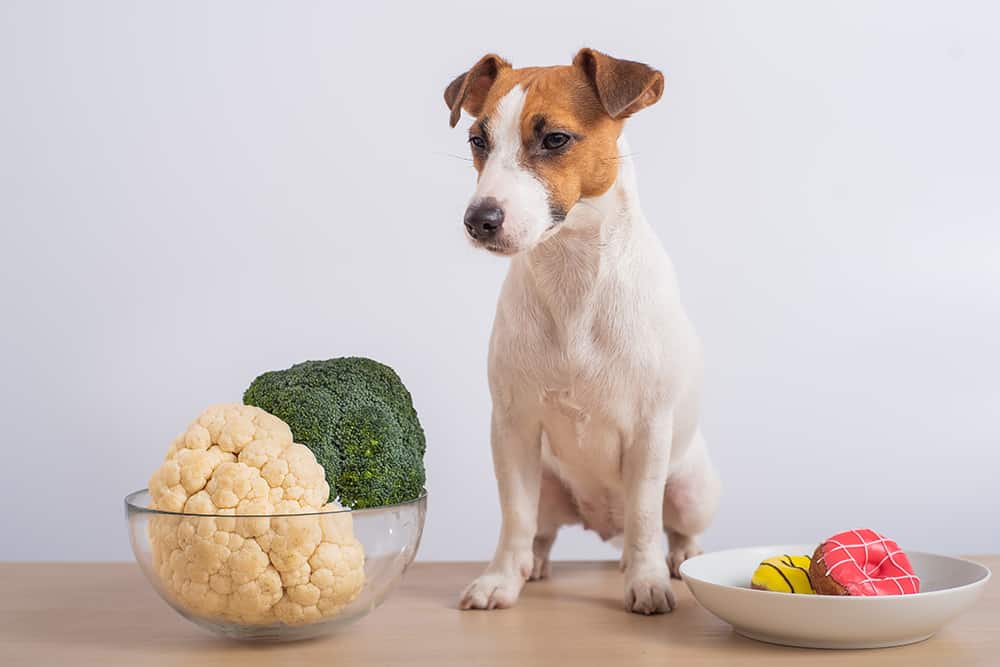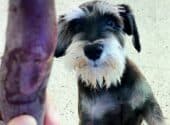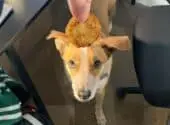Dog’s can be enthusiastic eaters, often trying to get their paws on anything in sight. Often as you tuck into a meal they will be sat next to you, looking adoringly into your eyes in an attempt to convince you to give them some.
Whilst it can be tempting to give them some, certain foods are not recommended for dogs as they can be harmful and will often result in vomiting, and in the worst case, an emergency visit to the vets.
To avoid this, it is important to make yourself aware of the foods that are safe for your dog as well as those that aren’t.

Cauliflower is one of several vegetables that belong to the Brassicaceae family. A cauliflower is made up of the core, the head, and an outer layer of leaves; all of which are edible. It is added to many dishes and is even used to make rice.
If you often cook with cauliflower, you may be wondering whether it is safe for your dogs, and if so, what parts can they eat.
Below, we have created the ultimate guide that covers everything that you need to know about feeding your dog cauliflower from the possible benefits to potential hazards. Continue reading to discover more.
Can Dogs Eat Cauliflower?
It is safe to feed your dog cauliflower in small, measured amounts. This is because too much cauliflower can cause gassiness and other digestive problems.
Cauliflower has a lot of nutritional value. It doesn’t contain toxins and it is rich in minerals and vitamins.
This vegetable is also high in protein and is a source of calcium, potassium, and fiber. Cauliflower also acts as an anti-oxidant and will help to fight certain diseases in humans such as heart disease.
Moreover, cauliflower contains a lot of sulforaphane and this can have several health benefits as it is believed to reduce high blood pressure as well as help to prevent diabetes.
Not only is cauliflower good for humans but it can have benefits for dogs too. The vitamins support the health of your dog’s vision and immune system. It also encourages healthy muscles, blood, and liver.
The fiber in cauliflower can help with digestion and bowel movement. Fiber can also help to regulate any possible health issues. Moreover, potassium and calcium aid in the development of healthy bones and provide them with the nutrients that they need to keep their strength.
There are different varieties of cauliflower and the nutritional value can differ depending on the type.
Brown, purple, green, and yellow are the most popular types of cauliflower, however, there are a few rarer varieties too. Purple cauliflower in particular is an excellent source of dietary fiber and it also contains lots of vitamins and minerals.
How Much Cauliflower Can Dogs Eat?
As we have mentioned, it is important to make sure that you feed your dog cauliflower in moderation.
Although cauliflower contains a lot of nutrients that will support your dog’s health, feeding them too much may result in gastrointestinal issues such as gas, nausea, and diarrhea.
Smaller dogs in particular are likely to experience more complications with their digestive systems. This is because their stomachs are a lot smaller so they will struggle to handle larger quantities of cauliflower.
It is recommended that you prepare the cauliflower yourself because you can then control how much your dog eats. You will also be able to make sure that it doesn’t mix with other ingredients that may be harmful to your dog.
Cauliflower should not be added to your dog’s diet as a substitute for a meal. Instead, it should be given as a snack once a week.
How To Prepare Cauliflower To Feed To Your Dog
Many recipes use cauliflower as a core ingredient, but they aren’t all suitable for dogs.
Raw and cooked cauliflower is believed to be safe for dogs, however, it is worth bearing in mind that raw cauliflower has a tough texture which may be difficult for them to digest. This may also increase the risk of your dog choking as they attempt to chew it.
When cauliflower is cooked, it becomes softer and therefore easier for your dog to consume. It is important to be cautious about the salt content of tinned cauliflower because too much salt can lead to vomiting and diarrhea.
Cauliflower can be boiled, steamed, mashed, roasted, and grilled. After cooking the cauliflower you should avoid adding any seasonings or spices to it.
Can Dogs Eat Cauliflower Rice?
Cauliflower rice is safe for dogs to eat. Again, it is important to make sure that you regulate the size of the portions and feed it to your dog in moderation. You should also make sure that it is not seasoned or spiced.
You must also ensure that the rice does not have a high salt content.
Although cauliflower rice is readily available from the majority of supermarkets, it is not recommended that you give this to your dog. This is because it usually contains preservatives and additives.

Instead, you should make your own cauliflower rice. By preparing the rice yourself, you are going to be able to control what goes into it. When prepared correctly, cauliflower rice is a dish that doesn’t contain a lot of calories.
It can be especially beneficial for dogs that are on a special diet for weight loss.
Cauliflower rice is easy to make and can be rustled up in as little as 5 minutes. First, you will need to chop the cauliflower up into small florets and then put them into a food processor. Utilize the pulse function until the consistency of the cauliflower resembles that of rice.
Can Dogs Eat Cauliflower Cheese?
Cauliflower cheese can be fed to dogs because basic cauliflower cheese recipes are not thought to be toxic. However, it is important to be cautious because some dogs may be lactose intolerant. If your dog is intolerant to dairy, you should completely avoid feeding them cheese.
This is because eating the cheese may trigger an adverse reaction resulting in potential gastrointestinal issues.
There are some recipes that call for the use of garlic and onions and there are also some pre-made varieties of cauliflower cheese that use both of these ingredients.
Both garlic and onion are harmful to dogs so consumption can leave them feeling unwell.
Essentially deciding whether or not to feed your dog cauliflower cheese is the decision of the owner. Some may choose to feed their dog a very small amount, whilst others may choose to avoid it completely.
If you decide to give your dog cauliflower cheese, ideally it should contain a minimal amount of cheese as this will minimize the chances of your dog’s stomach reacting adversely.
Can Dogs Eat Cauliflower Leaves?
Dog’s have a shorter digestive tract than humans, because of this, you have to be careful about what parts of the cauliflower you feed them. You should avoid giving them the stem, however, the leaves and the other parts of the cauliflower are suitable for their consumption.
Eating dark green vegetables can have many health benefits. They are a good source of vitamins and minerals and are also believed to protect bones from certain diseases as well as fighting against inflammation.
According to research, cauliflower leaves contain more vitamins and minerals than the cauliflower itself.
Because of this, some people may prefer to feed their dog the leaves instead of the vegetable, alternatively, you may wish to give them a combination of both – just remember that you don’t give them too much.
Cauliflower leaves are not only rich in minerals and nutrients, but they are an excellent source of protein and calcium.
Now you may be wondering whether the leaves should be cooked or whether you can serve them to your dog raw.
First, you must wash the leaves before cutting them up into chunks that your dogs can eat, making sure that they do not present a choking hazard. Although cauliflower leaves can be eaten raw, you may prefer to cook them so that they are a little softer. If you plan on cooking the leaves, one of the easiest ways of doing so is steaming them.
Cauliflower leaves should not be given as a replacement for a meal. It is recommended that you feed them to your dog as a treat approximately once a week.
Can Dogs Eat Cauliflower Pizza?
Although it may sound peculiar, cauliflower pizza is becoming increasingly popular. The base is made from cauliflower and it is then topped with an array of ingredients.
Generally, it is not recommended that you feed your dog cauliflower pizza. This is because although the base is safe to eat as it is made from cauliflower, the rest of the pizza isn’t going to be suitable for your dog.
Pizzas tend to have a lot of seasoning as this enhances the taste. Pizza is also usually topped with a lot of cheese, and again, this can cause problems for dogs that have a dairy intolerance.
The sauce and other seasonings and toppings can also be difficult for dogs to digest. If you are buying pre-made cauliflower pizza, you cannot control the ingredients that are in it.
As such, it is best not to give your dog cauliflower pizza because this is going to avoid the risk of them suffering any potential health complications.
What Other Vegetables Are Safe For Dogs To Eat?
There are a few other vegetables that are safe for dogs to eat. You must make sure that the vegetables you feed your dog are not cooked in any butter or oils. They should also be free from any additional flavorings.
Broccoli is safe for dogs to consume, however, similar to cauliflower, it should only be given in small amounts. Raw and cooked broccoli are suitable for dogs. It is an excellent source of fiber, it’s low in fat, and also contains vitamin C.
If your dog eats a lot of broccoli it may begin to suffer from an upset stomach. Other side effects include bloating, diarrhea and nausea. Do not feed them the stalks because they present a choking hazard.
Carrots are another vegetable that is safe for dogs to eat. Carrots are low in fat and are also rich in fiber and vitamin A. Moreover, carrots can also help to keep your dog’s teeth healthy.
They can be given to your dog daily and are also a good alternative to regular dog treats. A lot of dogs will eat carrots raw, however, they can be steamed or boiled. Carrots aren’t believed to have any negative effects on dogs.
If your dog has an allergy to carrots, it may start to suffer from vomiting and diarrhea. 1in this case, you should not continue to feed them carrots.
Dogs can eat peas, however, there are certain varieties that you should feed them. Garden peas, sugar snap peas, and snow peas are safe for dogs, but you should not feed them tinned peas.
This is because tinned peas are high in sodium and this is harmful to dogs. Peas are rich in minerals, vitamins, protein, and fiber.
Other vegetables that are safe for dogs to eat include celery, cooked sweet potatoes, and green beans.
What Vegetables Are Not Safe For Dogs To Eat?
Certain vegetables should not be fed to dogs as they can result in health problems. It is important to make yourself aware of the vegetables that are not suitable for dogs to consume to help to avoid any issues.
As we have mentioned, onions and garlic are not safe for dogs. The flesh, leaves, and juice of onion are toxic to dogs regardless of whether it is raw or cooked. Likewise, garlic is poisonous and harmful to dogs. It can also lead to a breakdown in red blood cells.
Cabbage is said to be safe for dogs, however, it is known to contain excessive gas so it is very important to make sure that you do not give them too much.
Tomatoes contain solanine, an element that many dogs are allergic to. For this reason, it is generally recommended that you avoid giving your dog tomatoes.
Other vegetables that are not deemed to be safe for dogs include eggplant, mushrooms, and kale.
Final Thoughts
As you can see, cauliflower is safe for dogs to eat so long as you do not give them too much at once.
Cauliflower rice and cauliflower leaves are safe for dogs, but you should be a little more cautious about feeding them cauliflower cheese. You should also avoid feeding them cauliflower pizza.




